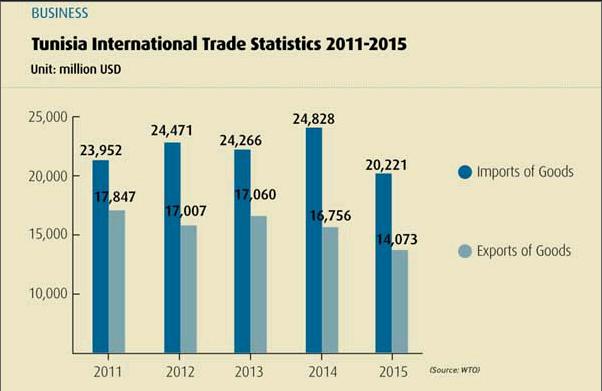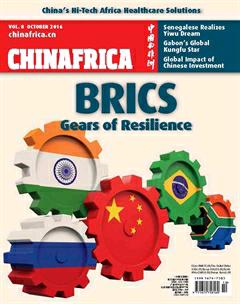Seizing the Moment
By+Hichem+Karoui

the international conference on Investment to be held in Tunisia on November 29-30 will mark the end of the campaign for the promotion of Tunisias 2016-20 five-year program. This program aims to give new impetus to public and private investment, which was around 19.4 percent of GDP in 2015, bringing it to 24 percent in 2020 according to the Tunisian Government. This should reduce unemployment rate by three percentage points through the creation of 400,000 jobs and inject about $60 billion into the economy over the next five years. But Tunisia is now facing an urgent choice.
Tunisian youth are the first victims of the economic downturn. These young people, most of whom are university graduates, do not have much of a choice, We need to help them find work by injecting significant investments into the Tunisian economy.
Calling for help
Friends of Tunisia - including China - could definitely help in two ways: the first is to assist Tunisians in building the foundations of sustainable economic growth. For this, Tunisia should aim at a synchronized development of three key sectors: agriculture (long neglected, even though the country is endowed with the most fertile land); industry (the country is severely lagging behind in this area, because of a lack of investment and lack of vision); and services (tourism, once flourishing, has been the first victim of the surge of terrorism that has followed the revolution).
Today, Tunisia is a social, economic, political, and cultural construction site. Everything has to be built or rebuilt. Tunisia needs to invest to develop and modernize agriculture, diversify production, boost exports, open factories and restore and build new infrastructure.
Those are projects that lead to job creation. But all this costs money. Even if Tunisia would take on debt from the World Bank for the next 30 years, it could not achieve this without the help of its friends. Besides, why turn to the World Bank and the IMF when there are countries that lend money to these two institutions? Why not instead turn directly to these countries and introduce them to projects that would earn them as much or more than their investments in other countries?
Tunisia could offer encouraging words to foreign investors, starting by alleviating the administrative burden and opening up its economy(still rated “not free” by the Index of Economic Freedom of the Heritage Foundation). In this years index, Tunisia is 11th out of 14 countries in the Middle East/North Africa region and 114th in the world. Its only consolation is that three major countries - Egypt, Algeria, and Iran - ranked behind it. But thats little help when considering that Bahrain, with almost as much oil as Tunisia, ranked first in the region.
Free-trade solution
One of the first things to do would be to focus on free-trade solutions, perhaps with the help of China, the world second largest economy. It is known that in 2008 China and Tunisia had begun negotiations over a free trade agreement. Apparently, these negotiations ended in failure. Is now not the appropriate time to restart them?
Another thing would be to negotiate with China one or more partnerships in joint projects that would bring profits and job creation to companies in both countries. Why not joint ventures?
Throughout Tunisia, merchants selling Chinese products have become a widespread phenomenon. Meanwhile, there is a trade imbalance between China and Tunisia, and the gap, though declining, is still quite big. Former Tunisian Minister of Trade Mohsen Hassen has stressed the need to review the trade policy with China.
But to better resolve this problem, why dont Tunisian authorities reorganize and better supervise the flow of goods that travel in both direc-tions, but end up on the Tunisian black market, thus avoiding paying duties and taxes to the Tunisian State?
On the other hand, if Chinese goods are competitive in comparison with those produced in Western countries, it is because they cost less to the producer. This price difference is attractive to Tunisian consumers, whose average salary is nothing to write home about. One of the most positive solutions to reduce this problem to a reasonable size is to open Chinese markets in major Tunisian cities. Such markets exist everywhere in the world, and no one is complaining. Why not start there?
Partnership upgrade
During his visit to Tunisia on May 13-14, Wang Yi, Chinas Minister of Foreign Affairs, spoke about “the need to strengthen bilateral relations between the two countries in the fields of economic development and investment,” by focusing on the “important role played by Tunisia in the Arab and African world.” Chinas chief diplomat reiterated Chinas willingness to help Tunisia increase its capabilities in terms of fighting terrorism, as well as to deepen bilateral cooperation on regional and international issues.
For his part, the Tunisian President Beji Ca?d Essebsi underlined that China contributes in a posi- tive way to Tunisias economic development and expressed his ambition to elevate Tunisia to the rank of an economic partner of China.
During the visit, there were talks of Chinese support for projects to be carried out in Tunisia as part of the 2016-20 five-year program, as well as Chinese financing of five projects in the health sector. An agreement on economic and technical cooperation was signed between the two countries. Under the agreement, China will assist $14.1 million to Tunisia for the construction of a university hospital in Sfax City. The project is expected to start in October.
The Great Wall of China has existed for centuries. If we do not bother to climb on top of it, we will never be able to see how splendid the surrounding landscape is, and we will never fully realize how much strength was needed to build it. Similarly, with its strong GDP growth, modern China continues to upset the odds; its great economy, despite the slowdown in growth, was not built in a day nor without much effort.
When will Tunisians finally rise up and stand on their own Great Wall?

